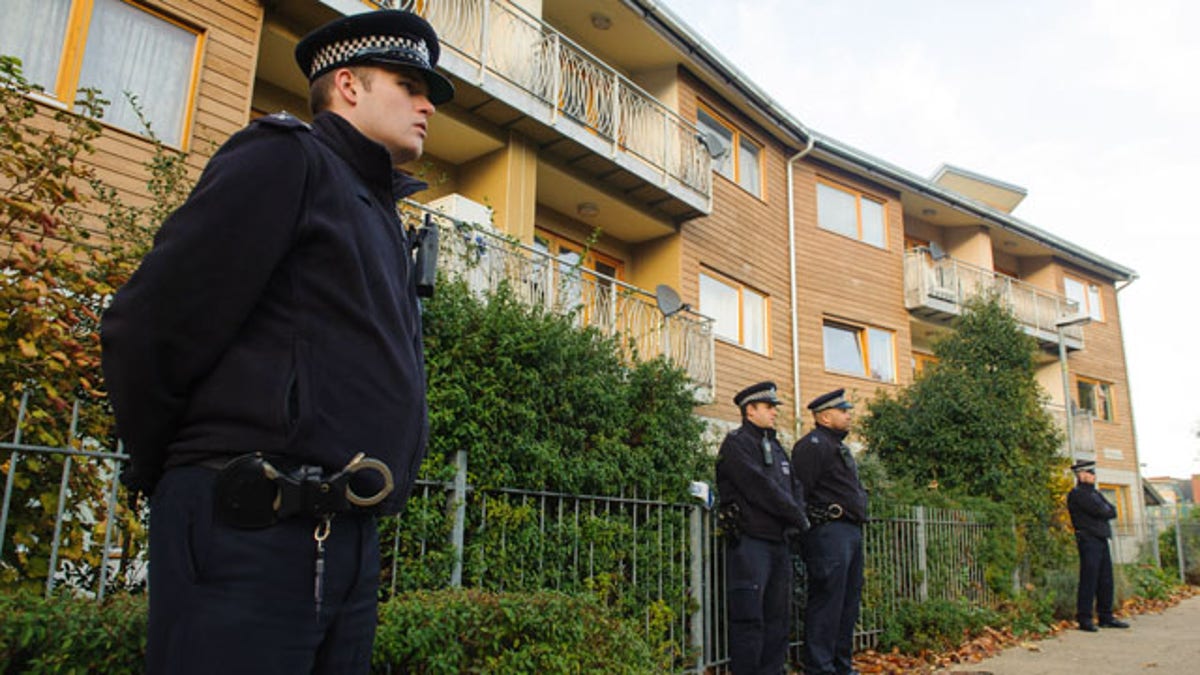
November 23, 2013: Police officers stand outside flats as police conduct house-to-house inquires in the area where three women were rescued in south London. UK police said Saturday that a collective living situation based on shared political beliefs is at the root of a major slavery case that led to the arrest of two suspects this week.
New details emerged Saturday in the bizarre case of three suspected female slaves allegedly held for 30 years, with police indicating the unusual household arrangement started as a collective of people with shared political beliefs.
While much of the case is still a mystery, British police said the two suspects — a man and a woman from India and Tanzania — bonded with two of the reported victims because of commonly held political views and lived with them in a communal situation, apparently in the Brixton area of south London.
"We believe that two of the victims met the male suspect in London through a shared political ideology, and that they lived together at an address that you could effectively call a 'collective,'" said Metropolitan Police Commander Steve Rodhouse.
The collective eventually broke up, but the two women stayed on, for reasons the police say they do not yet fully comprehend. The third woman is a 30-year-old, who apparently spent most of her life under the control of the two suspects with only closely managed contact with the outside world.
"Somehow that collective came to an end and the women ended up continuing to live with the suspects," Rodhouse said. "How this resulted in the women living in this way for over 30 years is what (we) are seeking to establish, but we believe emotional and physical abuse has been a feature of all the victims' lives."
The disclosure Thursday that a 69-year-old Malaysian, a 57-year-old Irish woman and a 30-year-old Briton were freed after three decades prompted questions about how such a tragedy escaped notice for so long. Many puzzles still remained Saturday.
Rodhouse refused to provide any details about the communal living situation or the political beliefs that united the group. It is not clear if they were bound by common religious views, a commitment to political or social change, or other factors.
Police have said the three victims were subjected to repeated beatings and kept in place by "invisible handcuffs" rather than physical constraints. They have indicated sexual abuse was not involved.
New information was also revealed Saturday about the two suspects, who have been freed on bail until a court hearing in January. Rodhouse said they came to Britain in the 1960s. The suspects, who have not been named or charged with any crime, are a male and female couple, both aged 67.
Rodhouse said a birth certificate for the 30-year-old alleged victim has been located but that no other official documentation about her life has been found. Authorities have not indicated if she was allowed to attend school or whether she is related to either the suspects or either of the other two victims.
Police have said the three women may have been brainwashed.
Ian Haworth, who founded Britain's Cult Information Centre, said he suspects the communal situation involved a cult of some type in which the victims were subjected to mind control techniques.
"Everything I've heard suggests it could well be a cult," he said. "The use of the term 'invisible handcuffs' emphasized it. It's a great description of mind control, thought reform, and psychological coercion."
He said the victims, who apparently were not confined to the apartment and were sometimes allowed out in chaperoned situations, may have been programmed to think of the apartment as the only safe place on Earth.
"You appear to be free to come and go but you're not," he said. "In a cult, you are programmed to think that everyone outside the group is against you.
He said is it not necessary for cult members to live together but that doing so gives the leader even more control. Haworth said it may take a year for the victims to revert to the personalities they used to have.
The situation of the younger woman who has never known freedom may be even more fraught.
Police said they cannot rush the complex investigation for that reason.
"I have said from the start that our priority was the safety of the women who are the victims at the heart of this," Rodhouse said. "That does not just mean their physical safety but their emotional and mental well-being also. To gain the trust and confidence of highly traumatized victims takes time, and this must move at their pace, not anyone else's."
The arrests were made after the Irish woman phoned the Freedom Charity last month to say she was being held against her will along with two others. The charity engaged in a series of clandestine conversations with the women and contacted police. Two of the women eventually left the house, and police rescued the third.
Police said Saturday that as part of an agreement with the charity, police had agreed not to move in and make arrests when the women were leaving. They waited nearly a month — "working to gain their trust and evidence," Rodhouse said — before arresting the suspects.
The identities of the three women have not been released; police said any information that might lead them to be unmasked would be withheld.
Police on Saturday tried to contact local residents in the gentrifying area of Brixton for information about the suspects.
Anita Prem, founder of the charity, said the group has received an "extraordinary rise" in calls from people seeking help since the dramatic case was made public Thursday.
"We are needing to increase our resources to cope with this extra demand," she said.
